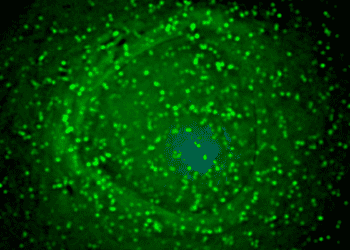Donor and recipient regulatory T-cells may promote transplant tolerance in mice
1. Depletion of all Foxp3+ regulatory T-cells (Tregs) induced rejection of stable skin and heart allogeneic transplants in a hematopoietic chimeric mouse model.
2. The presence of either donor or recipient Tregs was sufficient to maintain tolerance of both skin and heart transplants.
Evidence Rating Level: 2 (Good)
Study Rundown: Allogeneic transplants, for which tissue is sourced from the same species, are often rejected by the transplant host. One strategy to reduce rejection events involves the creation of a hematopoietic chimeric recipient, in which hematopoietic stem cells (HSCs) from a donor are injected into the recipient. HSCs are the source of immune cells, including Tregs known to modulate the natural immune response and therefore believed to promote transplant acceptance. In a HSC chimeric mouse, both donor and recipient Tregs exist in equilibrium and both regulate the recipient immune response.
In this study researchers used a chimeric mouse model to explore the role of Tregs in allogenic transplant recipients. After receiving allogeneic heart and skin transplants, chimeric mice populations underwent treatment to deplete all, just donor, or just recipient Tregs. They found that depletion of both donor and recipient Tregs in the host led to rejection of the previously accepted heart and skin transplants. Interestingly, depletion of just one genetic Treg group (donor or recipient), did not lead to rejection of the transplant. This finding suggests that Tregs from either donor or host are sufficient to maintain the necessary Treg population required for transplant acceptance. While the mechanisms have yet to be fully revealed, this finding highlights the importance of Tregs in allograft tolerance.
Click to read the study in American Journal of Transplantation
Relevant Reading: Long-term prevention of chronic allograft rejection by regulatory T-cell immunotherapy involves host Foxp3-expressing T cells
In-Depth [animal study]: This study investigated how the depletion of Foxp3+ Tregs in chimeric mice affected skin and heart allograft tolerance. To create allogeneic mouse chimeras, recipient mice were treated with a nonmyeloablative dose of total body irradiation followed by injection of bone marrow cells from sex-matched donor. In BL6.Foxp3DTR mice, treatment with diptheria toxin (DT) depleted Tregs. Thus, use of this mouse line as HSC donor (Group B), HSC recipient (Group C), or both (Group A) allowed for the creation of chimeric mice in which selective depletion of donor-derived and/or recipient-derived Tregs was possible. Such chimeric mice received sex-matched allogeneic skin and subsequent heart grafts. Four weeks after heart transplant, graft-tolerant recipients were treated with DT.
With these chimeric mice, researchers evaluated the effect of depleting both donor and recipient Tregs (Group A), just donor Tregs (Group B), or just recipient Tregs (Group C). Within 35 days of DT treatment, approximately 85% of allografts were rejected in Group A mice. DT treatment of Group B or Group C chimeric mice did not lead to allograft rejection. While Group A mice demonstrated some variation in the hematopoetic population subsets (e.g. increased CD3+ cells in the peripheral blood), the relative number of donor to recipient hematopoietic cells remained relatively constant (insignificant difference by day 23 post DT treatment). When skin implants differing in MHC expression were used in the Group A chimeric mice, the allograft was not rejected following DT treatment. This demonstrated that tolerance of MHC alloantigens in skin may not depend on Foxp3+ Tregs.
More from this author: The 3C Study: Alemtuzumab may reduce acute rejection following kidney transplant, Paclitaxel-coated balloons may decrease bronchial stenosis in lung transplants, Chemokines in cardiac allografts promote graft rejection in mice, Modulating lymphocyte populations decreases graft rejection in mice,Adding Evolocumab to statin therapy further decreases LDL-C levels
Image: PD/NIH
©2012-2014 2minutemedicine.com. All rights reserved. No works may be reproduced without expressed written consent from 2minutemedicine.com. Disclaimer: We present factual information directly from peer reviewed medical journals. No post should be construed as medical advice and is not intended as such by the authors, editors, staff or by 2minutemedicine.com. PLEASE SEE A HEALTHCARE PROVIDER IN YOUR AREA IF YOU SEEK MEDICAL ADVICE OF ANY SORT.

![Engineered stem cells mitigate liver damage caused by radiation [PreClinical]](https://www.2minutemedicine.com/wp-content/uploads/2014/12/Human_embryonic_stem_cells-350x250.png)






